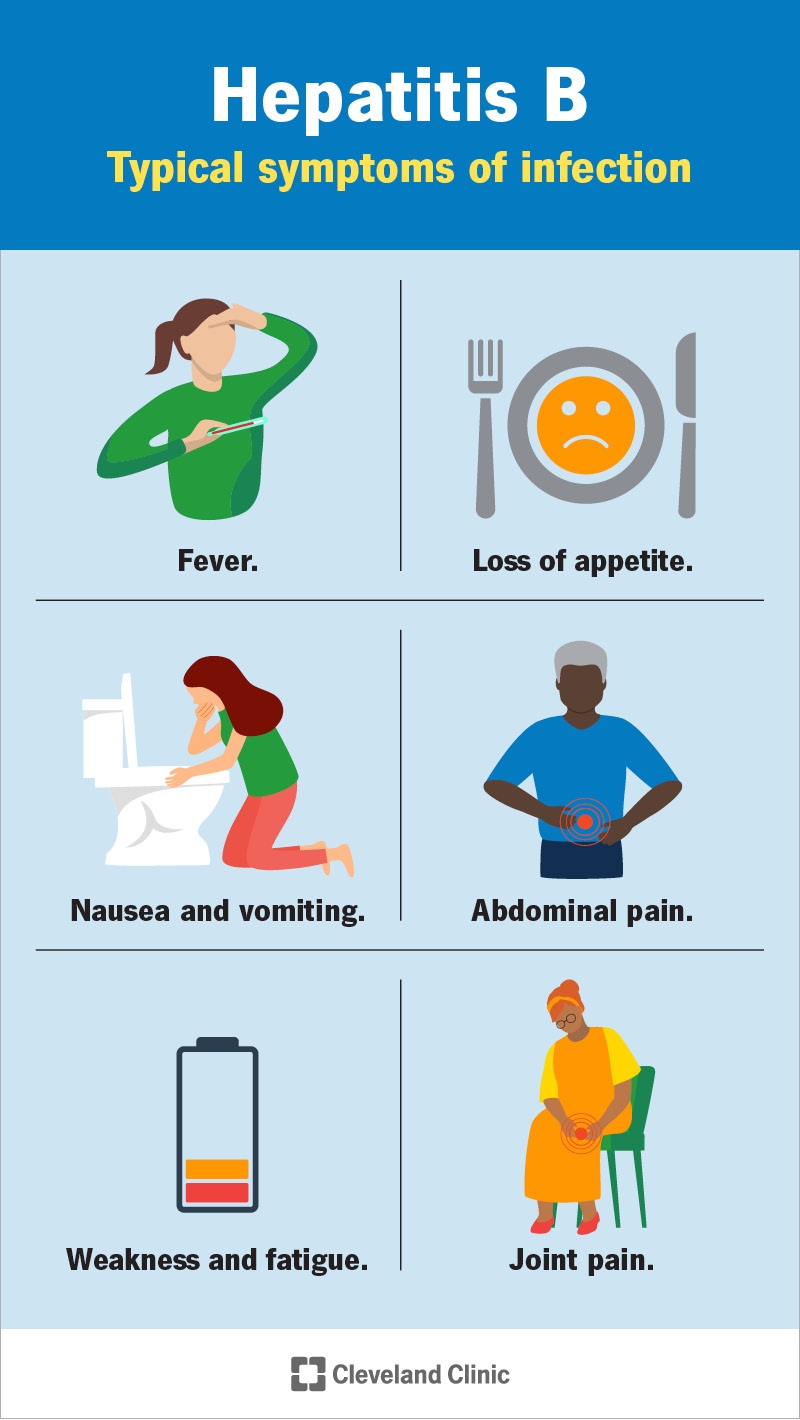Hepatitis B is a viral infection that damages your liver. You can get it if you’re exposed to infected bodily fluids. The acute form of the virus often goes away without treatment. But chronic hepatitis B is an incurable illness. Treatment is medication to reduce the risk that the virus will spread or cause complications.
Advertisement
Cleveland Clinic is a non-profit academic medical center. Advertising on our site helps support our mission. We do not endorse non-Cleveland Clinic products or services. Policy
Hepatitis B is a viral infection that causes inflammation in your liver. It can be a brief illness that may not cause symptoms and goes away without treatment. This is acute hepatitis B. But some people have a chronic (long-term) form of the virus. It can lead to cirrhosis and liver failure.
Advertisement
Cleveland Clinic is a non-profit academic medical center. Advertising on our site helps support our mission. We do not endorse non-Cleveland Clinic products or services. Policy
There’s no cure for hepatitis B. But there are medications that can make the virus inactive. Inactive hepatitis B means you have the virus. But inactive viruses can’t spread.
Hepatitis B is the most common liver infection in the world. The World Health Organization (WHO) estimates that 254 million people worldwide are living with hepatitis B. The U.S. Centers for Disease Control and Prevention (CDC) estimates that approximately 14,000 people in the U.S. have acute hepatitis. The CDC also estimates that 640,000 people in the U.S. have chronic hepatitis B.

Image content: This image is available to view online.
View image online (https://my.clevelandclinic.org/-/scassets/Images/org/health/articles/4246-hepatitis-b)
You can have hepatitis B without having symptoms. If you do, symptoms may include:
You may also have symptoms of liver disease, including:
You get hepatitis B if you’re exposed to bodily fluids from someone who has the virus. This can be amniotic fluid, blood, menstrual fluid, saliva, semen or vaginal fluid. Exposure to bodily fluids can happen if you:
Advertisement
Anyone can get hepatitis B. But you may have increased risk if you:
You’re contagious as long as the virus is active in your body. For example, acute hepatitis B can last for up to six months. You can spread the virus that entire time. If you have active chronic hepatitis B, you’ll be contagious for the rest of your life. If you have inactive chronic hepatitis B, the risk would be lower. Your healthcare provider can do blood tests to find out if you have an active or inactive virus.
Acute and chronic hepatitis B may cause complications like:
A healthcare provider will ask you about your symptoms and do a physical examination. They’ll ask if you have a family history of liver disease. They may ask if:
You may feel hesitant about answering these very personal questions. Your provider understands they may be hard questions to answer. But they’re only asking them to understand your situation so they can help you.
Your healthcare provider will do:
Your treatment will be different depending on your situation. Treatments may include:
Prophylactic treatment is when healthcare providers give you medication to prevent a disease. Providers prescribe prophylactic treatment if you were exposed to the virus within the past 24 hours. Medications include:
Advertisement
There’s no specific treatment for acute hepatitis B. Your provider may give you IV fluids if you throw up a lot and have diarrhea. The fluids will prevent dehydration. Dehydration is when you lose so much bodily fluid that your body can’t work as it should.
Chronic hepatitis B treatment varies depending on your symptoms and your overall health. Treatment options are:
Vaccination is the best way to prevent an infection. It takes three doses of the hepatitis B vaccine before you’re completely protected. You’ll receive shots over six months. In the meantime, things you can do to reduce your risk include:
Advertisement
Your first step is to find out if you have the virus. The CDC recommends that everyone aged 18 and older have a hepatitis B test. If you have acute hepatitis B, you should stay home from work and not spend time with others until your symptoms go away. If you have the chronic form of the disease, your healthcare provider may prescribe medication that reduces the risk you’ll spread the virus.
Chronic hepatitis B symptoms can change over time. One way you can take care of yourself is to stay connected with your healthcare team. Other suggestions include:
Advertisement
Hepatitis B, like most hepatitis viruses, can sneak up on you. You can have it without knowing it. You may have a short-term form of the virus. But often, hepatitis B is a chronic illness for which there’s no cure.
If tests show you have hepatitis B, you may wonder how the disease will change your life. You may worry about spreading the virus to others. The good news is there are medications that keep chronic hepatitis B from spreading. And there are steps you can take to protect your overall health and protect others.
Your healthcare provider will help you plan for living with hepatitis B. And there are support groups that create a safe place for you to share your story. You’re not alone.

Sign up for our Health Essentials emails for expert guidance on nutrition, fitness, sleep, skin care and more.
Learn more about the Health Library and our editorial process.
Cleveland Clinic’s health articles are based on evidence-backed information and review by medical professionals to ensure accuracy, reliability and up-to-date clinical standards.
Cleveland Clinic’s health articles are based on evidence-backed information and review by medical professionals to ensure accuracy, reliability and up-to-date clinical standards.
Untreated hepatitis can cause liver damage or failure. Cleveland Clinic’s expert providers offer you the latest treatments and caring support.
